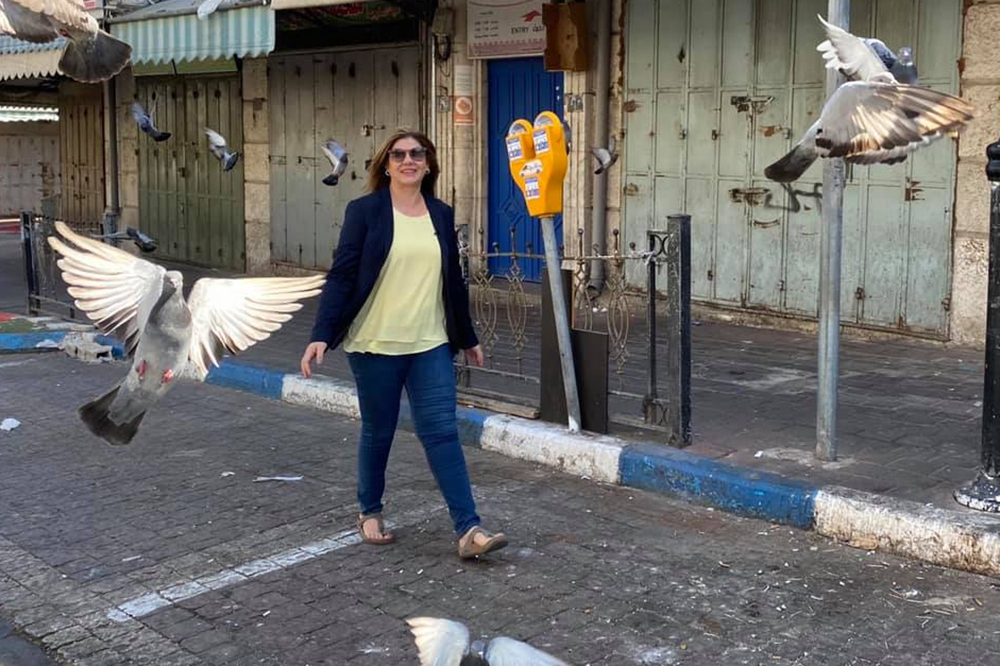
A group of Israeli human rights organisations, scholars and members of civil society have formally requested two United Nations special rapporteurs to probe the killing of Palestinian-American journalist Shireen Abu Akleh.
Abu Akleh, a veteran journalist for Al Jazeera, was killed on May 11 by Israeli forces carrying out a military raid in the Jenin refugee camp in the occupied West Bank. Abu Akleh, 51, was wearing a vest marked “PRESS” and a helmet when a bullet pierced her head from the back.
The letter, signed by the rights groups ‘Looking the Occupation in the Eye’, ‘Mothers Against Violence’, and ‘Machsom Watch’, among others, was addressed to the UN Special Rapporteur on Extrajudicial Summary or Arbitrary Killings Morris Tidball-Binz and the UN Special Rapporteur on the Occupied Palestinian Territories Francesca Albanese.
The missive cites a slew of cases wherein Palestinian journalists have been shot or injured with little to no accountability. At least 45 journalists have been killed by Israeli forces since 2000, according to the Palestinian Ministry of Information. No Israeli soldier has been held responsible for killing a member of the media.
“Since the State of Israel enjoys 100 percent immunity and zero accountability from the international community, past experience proves that the State of Israel will not even open an investigation for fear of harming its PR,” the letter reads.
“In our understanding, Israel sees the backlash it received after Abu Akleh’s death as a passing episode of criticism that will soon be swallowed up in a variety of incidents and crises around the world, such as the war in Ukraine,” it says.
One of the UN Special Rapporteurs addressed by the letter welcomed it.
“We are currently considering the most effective course of action. The call from Israeli scholars and activists is important. It is a reminder that the Israel-Palestine question cannot and should not be treated as ‘an intractable conflict’ between two people, made of irreconcilable rivalry and an unassailable sense of identity,” Albanese told Al Jazeera when asked about the letter.
“Principled Israelis, and not only from the NGOs who are already engaged alongside the Palestinians in the pursuit of justice and accountability, oppose the occupation and related oppression of the Palestinians and demand an end to it. This is the most solid alliance to pave the way toward peace I can think of,” she added.
The Israeli military said that it will not open a criminal inquiry into the fatal shooting of Abu Akleh.
Israel had first denied that its forces had shot Abu Akleh, suggesting her killing could have been at the hands of Palestinian fighters. The Israeli army later backtracked and said that it could not investigate the matter without the fragmented bullet that was extracted from Abu Akleh’s head. The bullet remains with Palestinian authorities.
The Palestinian Authority (PA), as well as many international and local rights groups, believe Israel will not conduct a fair and just probe into Abu Akleh’s killing.
Israeli ‘deflection’
Yonatan Gher, executive director of Combatants for Peace, who signed the letter together with other organisations and activists, said, “It is clear that Israel will continue to attack any independent probing, such as the CNN investigation, as biased and antisemitic, to deflect the fact that regardless of the identity of the shooter – what killed Shireen Abu Akleh, and what kills so many journalists, and Palestinians and Israelis in general, is the occupation.”
Israeli human rights lawyer Eitay Mack, who is representing the signatories, said it is important that Israeli citizens and organisations signed on to the letter.
“It’s a letter of support to the UN experts that they should just do their jobs. Israel should not have 100 percent impunity. There must be accountability and the UN experts should not be afraid to investigate human rights violations no matter in what place and by what country they are being done,” said Mack, who is a signatory to the letter himself.
A Palestinian legal expert welcomed the move, saying it would apply some pressure on Israel and “expose” its human rights abuses to the international community. But Diana Buttu, a lawyer and former adviser on the Palestinian peace negotiations team, said more substantial steps should be taken to ensure accountability.
“A UN investigation will feed into the bigger case before the ICC [International Criminal Court], and that’s good, but the bigger question is whether something will come of it,” Buttu told Al Jazeera.
“The probe isn’t enough. The bigger issue is there needs to be a level of accountability, meaning Israel has to have some sort of punishment imposed on it, not just the soldier, but also the country itself,” Buttu said.







